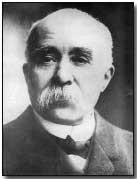Primary Documents - Dutch Newspaper Editorial Against the Terms of the Paris Peace Conference, May 1919
 With Germany's decision to
seek an
armistice - or face domestic as well as military collapse -
arrangements were set in place to convene a peace conference in Paris; the city was unanimously selected by the Allied powers.
With Germany's decision to
seek an
armistice - or face domestic as well as military collapse -
arrangements were set in place to convene a peace conference in Paris; the city was unanimously selected by the Allied powers.
The conference began somewhat belatedly in mid-January with opening addresses from many of the key Allies.
Click here to read French Prime Minister Georges Clemenceau's opening address in which he accepted the presidency of the peace conference. Click here to read the welcoming address given to delegates by French President Raymond Poincare; click here to read the opening address by U.S. President Woodrow Wilson; click here to read British Prime Minister David Lloyd George's address; click here to read Italian Prime Minister Sidney Sonnino's address. Click here to read an account of the run up to the opening session by the official British observer Sisley Huddleston.
Reproduced below is the text of a Dutch newspaper editorial condemning the severity of the proposed Allied peace terms.
Click here to read the German delegation's protest against the peace terms. Click here to read the Allied response. Click here to read a journalist's account of the signing ceremony.
Click here to read the text of the eventual peace treaty.
Dutch Algemeen Handelsblad Editorial on the Treaty of Versailles, June 1919
The peace conditions imposed upon Germany are so hard, so humiliating, that even those who have the smallest expectation of a "peace of justice" are bound to be deeply disappointed.
Has Germany actually deserved such a "peace"? Everybody knows how we condemned the crimes committed against humanity by Germany. Everybody knows what we thought of the invasion of Belgium, the submarine war, the Zeppelin raids.
Our opinion on the lust of power and conquest of Germany is well known. But a condemnation of wartime actions must not amount to a lasting condemnation of a people. In spite of all they have done, the German people is a great and noble nation.
The question is not whether the Germans have been led by an intellectual group to their destruction, or whether they are accomplices in the misdeeds of their leaders - the question is, whether it is to the interest of mankind, whether there is any sense in punishing a people in such a way as the Entente governments wish to chastise Germany.
The Entente evidently desires the complete annihilation of Germany. Not only will the whole commercial fleet be confiscated, but the shipbuilding yards will be obliged to work for the foreigner for some time to come.
Whole tracts of Germany will be entirely deprived of their liberty; they will be under a committee of foreign domination, without adequate representation.
The financial burden is so heavy that it is no exaggeration to say that Germany is reduced to economic bondage. The Germans will have to work hard and incessantly for foreign masters, without any chance of personal gain, or any prospect of regaining liberty or economic independence.
This "peace" offered to Germany may differ in form from the one imposed upon conquered nations by the old Romans, but certainly not in essence. This peace is a mockery of President Wilson's principles. Trusting to these, Germany accepted peace. That confidence has been betrayed in such a manner that we regard the present happenings as a deep humiliation, not only to all governments and nations concerned in this peace offer, but to all humanity.
These conditions will never give peace. All Germans must feel that they wish to shake off the heavy yoke imposed by the cajoling Entente, and we fear very much that that opportunity will soon present itself. For has not the Entente recognized in the proposed so-called "League of Nations" the evident right to conquer and possess countries for economic and imperialistic purposes? Fettered and enslaved, Germany will always remain a menace to Europe.
The voice and opinion of neutrals have carried very little weight in this war. But, however small their influence and however dangerous the rancorous caprice of the Entente powers may be to neutrals, it is our conviction and our duty to protest as forcibly as possible against these peace conditions.
We understand the bitter feelings of the Entente countries. But that does not make these peace conditions less wrong, less dangerous to world civilization, or any less an outrage against Germany and against mankind.
Source: Source Records of the Great War, Vol. VII, ed. Charles F. Horne, National Alumni 1923
A 'corkscrew' was a metal post for supporting a wire entanglement, with a twisted base enabling it to be screwed into the ground, removing the need for a hammer, the use of which could attract enemy fire.
- Did you know?
